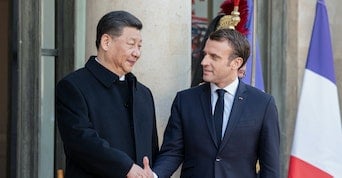Macron Is Not Wrong About China, the U.S. Should Worry

All Global Research articles can be read in 51 languages by activating the Translate Website button below the author’s name.
To receive Global Research’s Daily Newsletter (selected articles), click here.
Click the share button above to email/forward this article to your friends and colleagues. Follow us on Instagram and Twitter and subscribe to our Telegram Channel. Feel free to repost and share widely Global Research articles.
***
Not so long ago, following French President Emmanuel Macron’s Beijing visit, many in the U.S. reacted to his expressed desire to avoid confrontation with China with indignation, labeling the leader a fool and a puppet.
Evidently, the backlash didn’t phase Macron. He doubled-down, saying that “being an ally does not mean being a vassal… [or] mean that we don’t have the right to think for ourselves.” When it comes to responding to fluctuating China-U.S. tensions, Macron believes that for Europe no response is the best response.
And as much as some Americans might wish he was wrong, he is not.
Macron is not witless. He is making a case that prioritizes his country’s tangible interests, not the U.S.’s. These include focusing on his region, avoiding conflict with a major global power, and remaining a relevant actor in world affairs.
Critics like The Spectator World’s John Pietro may label Macron’s call for European strategic autonomy “fantastical” and “unpopular,” but reality is not on their side.
In fact, Macron’s view is very popular. According to the European Council on Foreign Relations, close to three-quarters of Europeans believe that the Continent should pursue increased independence vis-à-vis American military power. Additionally, the report shows that majorities in all surveyed countries believe that Europe should remain neutral in any conflict between China and the U.S. over Taiwan.
Josep Borrell, High Representative of the European Union for Foreign Affairs and Security Policy, has repeatedly advocated for strategic autonomy too, as he publicly emphasizes his desire to strengthen relations between China and the EU.
Three years ago, for instance, Borrell made the case for the framework exalted by Macron.
“[T]he world has changed. It is difficult to claim to be a ‘political union’ able to act as a ‘global player’ […] without being ‘autonomous,’” Borrell explains. “[T]he weight of Europe in the world is shrinking,” he acknowledges, claiming that “[t]he next two decades are going to be crucial because China will use them to become the first global power.”
With this in mind, the EU official concludes that “traditional alliances remain essential” but insufficient, and relations between countries will become “more transactional” as the power balance shifts.
Borrell looks at the changing world, and sees an opportunity to build a relationship with a powerful China, just like Macron does. For him, as for most Europeans, Russia poses a far more perilous threat than China. Much to some American neoconservatives’ disappointment, he sees no value in taking strong stances against China.
If the U.S. were to publicly and strongly reject Europe’s openness to China, Borrell may reconsider. But that has not happened. Hence, with precaution and measured language, Borrell and Europe writ large will likely continue to dance with both China and the U.S.
With eyes on Russia, it may seem like Europe and the U.S. have a phenomenal bond. When it comes to China though, that bond is not quite clear. So, while Americans’ gut reaction to Macron’s philosophy might be indignation, still, the U.S. must take Macron’s signals and framework seriously. Pretending he’s a lunatic simply won’t cut it.
*
Note to readers: Please click the share button above. Follow us on Instagram and Twitter and subscribe to our Telegram Channel. Feel free to repost and share widely Global Research articles.
Juan P. Villasmil is a foreign policy specialist. His work has been featured on The Wilson Center’s New Security Beat, The National Interest, RealClearWorld, and others. He is also a Young Voices contributor.
Featured image is from Frederic Legrand – COMEO/Shutterstock

